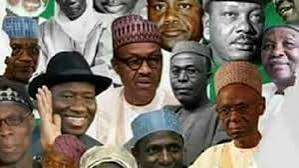
Leadership Question And The Future Of Nig
Traditionally, the histories of almost all pre-literate Nigerian societies are replete with records of well-organized political and administrative systems with noble leaderships through which the peoples were effectively governed.
From the historic Borno Empire in today’s northeastern region, to the Oyo Empire down the southwest of the country; and from the Sokoto Caliphate in the vast Northwest down to the Opobo Kingdom in the south-south axis, as well as the Kwararafa Empire of the north central peoples, Nigerians evolved leadership hierarchies that propelled steady progress and development within their respective enclaves and beyond. With these traditional governmental leaderships, the Nigerian people waged wars of unity and expansion which made most of the traditional leaders, respected men and women of history, variedly referred to today and hitherto taught in schools as subjects and objects of historical studies.
Indeed, under the Mais of the Kanem Borno to the Alaafins of the Oyo Empire, to the Dan-Fodios and the Jajas of Opobo amongst many other traditional leaders, the vast geographic entity known as Nigeria today, has had steady progress and prosperity.
These brands of past leaders exhibited high moral rectitude, discipline, selflessness and committed responsibility to the overall welfare of their people.
It was the presence and effectiveness of these African brands of leadership that made the conquest of Nigeria not only difficult, but also provided the invading European imperial expansionists, with effective modules and models for governing the people after subjugating them.
Thus, the subsequent growth of Nigerian nationalism was a direct byproduct of the kinds of leadership that existed within and amongst the Nigerian people prior to the European invasion.
Little wonder therefore, that throughout their sustained struggles and agitations, Nigerian nationalists fought selfless battles with uncommon patriotism, discipline and relentless concerns for the freedom and well-being of Nigerians.
This is why the Herbert Macaulays, Okoti Ebohs, the Enahoros, Tafawa Balewas, the Awolowos, the Nnamdi Azikiwes, the Ahmad Bellos, the Fumilayo Ransom Kutis and the Margaret Ekpos as well as Queen Amina of Zaria and Gambo Sawaba among many others will continue to remain heroes and heroines in the annals of the history of Nigeria.
As a matter of fact, after working very hard to free and secure a nation flowing with the proverbial milk and honey, these past heroes all died in penury, leaving behind only good names, which as it is often said, is better than silver and gold.
However, sadly somewhere along the line of Nigeria’s chequered political history, these patriotic legacies of honesty, discipline and selfless service to our dear motherland, miraculously evaporated, giving way to mediocrity, kleptomania and maddening greed and selfishness on the part of leaders.
Today, the children and grandchildren of the heroes have continued to parade themselves in pride and dignity that their forebears left for them.
To the contrary, leadership in Nigeria today has become a lucrative venture where aspiring leaders invest much resources, time and energies to acquire either by hook or crook, not necessarily to serve the interests of Nigerians, but to recoup their investments and amass profits.
Without any iota of doubt therefore, it is obvious that the question of credible, disciplined and selfless leadership has continued to be a conundrum yearning for credible solutions.
Basically, there is nothing wrong with the Nigerian character.
There is nothing wrong with Nigerian land or climate or water or air or anything else.
The Nigerian problem is the unwillingness or inability of its leaders to rise to the responsibility, to the challenge of personal example which is hallmarks of true leadership.”
This is therefore a strong indication that unless and until Nigerians come to terms with the realities and chooses leaders devoid of incomprehensible sentiments and shuns greed, the future and the needed development of the country will remain a mirage.
Dr. Musa Abdullahi, Edited By Grace Namiji



Commentary
Leadership Question And The Future Of Nig
todayOctober 9, 2024 16
Leadership Question And The Future Of Nig
Traditionally, the histories of almost all pre-literate Nigerian societies are replete with records of well-organized political and administrative systems with noble leaderships through which the peoples were effectively governed.
From the historic Borno Empire in today’s northeastern region, to the Oyo Empire down the southwest of the country; and from the Sokoto Caliphate in the vast Northwest down to the Opobo Kingdom in the south-south axis, as well as the Kwararafa Empire of the north central peoples, Nigerians evolved leadership hierarchies that propelled steady progress and development within their respective enclaves and beyond. With these traditional governmental leaderships, the Nigerian people waged wars of unity and expansion which made most of the traditional leaders, respected men and women of history, variedly referred to today and hitherto taught in schools as subjects and objects of historical studies.
Indeed, under the Mais of the Kanem Borno to the Alaafins of the Oyo Empire, to the Dan-Fodios and the Jajas of Opobo amongst many other traditional leaders, the vast geographic entity known as Nigeria today, has had steady progress and prosperity.
These brands of past leaders exhibited high moral rectitude, discipline, selflessness and committed responsibility to the overall welfare of their people.
It was the presence and effectiveness of these African brands of leadership that made the conquest of Nigeria not only difficult, but also provided the invading European imperial expansionists, with effective modules and models for governing the people after subjugating them.
Thus, the subsequent growth of Nigerian nationalism was a direct byproduct of the kinds of leadership that existed within and amongst the Nigerian people prior to the European invasion.
Little wonder therefore, that throughout their sustained struggles and agitations, Nigerian nationalists fought selfless battles with uncommon patriotism, discipline and relentless concerns for the freedom and well-being of Nigerians.
This is why the Herbert Macaulays, Okoti Ebohs, the Enahoros, Tafawa Balewas, the Awolowos, the Nnamdi Azikiwes, the Ahmad Bellos, the Fumilayo Ransom Kutis and the Margaret Ekpos as well as Queen Amina of Zaria and Gambo Sawaba among many others will continue to remain heroes and heroines in the annals of the history of Nigeria.
As a matter of fact, after working very hard to free and secure a nation flowing with the proverbial milk and honey, these past heroes all died in penury, leaving behind only good names, which as it is often said, is better than silver and gold.
However, sadly somewhere along the line of Nigeria’s chequered political history, these patriotic legacies of honesty, discipline and selfless service to our dear motherland, miraculously evaporated, giving way to mediocrity, kleptomania and maddening greed and selfishness on the part of leaders.
Today, the children and grandchildren of the heroes have continued to parade themselves in pride and dignity that their forebears left for them.
To the contrary, leadership in Nigeria today has become a lucrative venture where aspiring leaders invest much resources, time and energies to acquire either by hook or crook, not necessarily to serve the interests of Nigerians, but to recoup their investments and amass profits.
Without any iota of doubt therefore, it is obvious that the question of credible, disciplined and selfless leadership has continued to be a conundrum yearning for credible solutions.
Basically, there is nothing wrong with the Nigerian character.
There is nothing wrong with Nigerian land or climate or water or air or anything else.
The Nigerian problem is the unwillingness or inability of its leaders to rise to the responsibility, to the challenge of personal example which is hallmarks of true leadership.”
This is therefore a strong indication that unless and until Nigerians come to terms with the realities and chooses leaders devoid of incomprehensible sentiments and shuns greed, the future and the needed development of the country will remain a mirage.
Dr. Musa Abdullahi, Edited By Grace Namiji
Written by: Salihu Tejumola
Leadership Question And The Future Of Nig
Similar posts
Commentary
Need To Intensify Vector Control Services In Nig
todayOctober 11, 2024 16
Commentary
Safeguarding Critical National Assets For Sustainable Devt
todayOctober 10, 2024 17
Post comments (0)
Recent Posts
Recent Comments
Kapital Kruise
3:00 pm - 8:00 pm
Kapital Kruise
With Oyinye Agiriga
Unwind and Energize: Join us on an Electrifying Journey as Kapital FM 92.9 Abuja Presents the After-Work Extravaganza! Tune in from 3PM to 9PM and Let the Vibrant Rhythms Ignite Your Spirit. Welcome to the twilight hours...
closeTop popular
How Wike Transformed Abuja In 1year
CG VGN Congratulates New Service Chiefs, IG, NSA
Stainless Steel Juicer – Making Juicing Fun And Easy
Uzoka-Anite Assumes Duty As Minister Of Industry, Trade and Investment
Stainless Steel Juicer – Making Juicing Fun And Easy
Chart
1
Sunshine
Tommy Blues
Sunshine Tommy Blues
2
Red
Frank Lee
Red Frank Lee
3
Eclipse
Donna May
Eclipse Donna May
Full tracklist